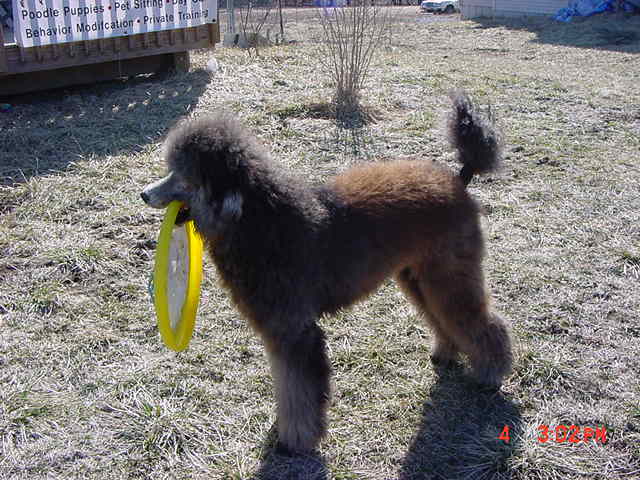Question Ivory the Standard and
Ivory the Standard and
QUESTION: After our standard first year, she started having what appeared to be seizures. In the last two years she has only had maybe 4 but I'm wondering if there is something I should be doing for her. Also, our black male (her brother) just had his first one today. It was worse than any she has had but it was his first as far as I know. They are both 3 years old.
ANSWER: Hello again J.
Sounds to me like your dogs have a genetic seizure condition since they are brother/sister and both have it. You might alert your Vet to the fact that both your dogs have a seizure condition, but unless you treat them, there is not alot they can do.
As to treatments though, unless the seizures are very frequent (about one every week or so) and your dog seems to have major suffering from them; the treatment, which is PhenoBarbatol (sp), is said to be worse than the seizures themselves.
The symptoms of a seizure can be anything from the dog standing still and not responding to verbal commands, fluttering eyelids, drooling, loss of bowels, loss of stability/not being able to stand, confussion, disorientation, stumbling or acting like they are drunk and/or uncontrollable shaking of limbs.
Sometimes a dog will give you signals that a seizure is coming on; my Silver dog, Striker, has had a number of seizures and before he goes into one, he is VERY clingy. He won't leave my side and if I sit down, he actually gets into my lap.
The best thing that you can do while your dog is seizing is to try and talk them through it, pet them and let them know you are there, and a little prayer wouldn't hurt any.
You can also keep a seizure diary for each dog that tells what time the seizure started, how long it lasted, what symptoms they had, and what the dog did just before and after the seizure. That way, you can let the Vet know whats going on with the dogs and how far apart the seizures are. If the seizure happens and you are able to get the dog into the vet while he/she is still seizing, then they can possibly find out what is causing the seizure, but that can only happen while the dog is in the middle of the seizure.
I hope this helps you some. If you have other questions for me, please feel free to ask.
Your dogs in the picture are so cute together, BTW.
Thanks for using AllExperts.com,
Kim
---------- FOLLOW-UP ----------
 Both of the chihuahas.
Both of the chihuahas.
QUESTION: Kim, thanks for being so quick. It really freaked me out today when our male, Javert, had a seizure for the first time since we've had him for 3 years. I'm sick about it. His was a bad one. Flopping all over the place, running into everything, drooling and not being able to stand. Then he laid still sprawled out on the floor because he couldn't stand up. Finally toward the end (about 5 min) he climbed up on the couch (which he knows he isn't allowed to do but of course I let him) and he just sat there and shook for another minute or so. Then it was over and he was clingy then fine. Of course, at first I worried that someone had poisoned him but then I read it was common in Standards right? The only reason I was suspicious was because we have an acre of land that borders 5 other properties. A few years back one of our chihuahuas was shot and killed with a bee bee gun. No problems since then but since Javert had never had seizures before this then I got suspicious but that's my nature anyway. So it is really common in Standards right?
AnswerHello again,
Sorry to hear about Javert's seizure. They are really horrible to watch.
Yes, they are fairly common in Std Poodles.
Canine Idiopathic Epilepsy and Standard Poodles
If you are concerned that your dog might have canine idiopathic epilepsy, a visit to your veterinarian is necessary to diagnose this issue. Your vet will consider your dog's breed and age, record any incidence of seizures and run some fairly standard diagnostics. If your dog is an adult and suddenly has seizures out of no where, there might be an active brain disease in play; if however, your otherwise normal dog has few seizures a year, this is indicative of canine idiopathic epilepsy.
After a diagnosis of canine idiopathic epilepsy, there are several possible treatments. If the seizures remain mild, and for many dogs they do, the only thing the owner needs to do is be watchful for the development of a grand mal seizure, which will require emergency attention. Phenobarbital is the drug that is most commonly used to treat this condition, and is quite safe; it is often recommended as regular medication in the case of more severe issues. Anticonvulsants and even acupuncture might be recommended. If medication is necessary, you will need to administer regularly and report back to your vet on the effect it has on your pet. Be prepared for the dosage to change as your dog might have specific needs and unforeseen reactions. Take it slow and watch carefully to see how each new dosage affects your dog.
As you can see, this condition, while distressing, does not need to be a serious impediment in your dog's life. If you feel that this might be a problem, consult with your veterinarian and find out what your options are!
Here is a good site that will help answer your questions about Canine Epilepsy.
http://www.canine-epilepsy.com/Resources.html
Good Luck and again, if you have any other questions about Seizures or other Poodle questions in general, please ask.
Kim



 Silver vs. black puppy
QuestionHi,
I have 3 puppies left of my first litter of
Silver vs. black puppy
QuestionHi,
I have 3 puppies left of my first litter of
 Odd Change in Hair Color
QuestionAbbey at 2
QUESTION: My chocolate standa
Odd Change in Hair Color
QuestionAbbey at 2
QUESTION: My chocolate standa
 puppy colors
QuestionI have bred my standard poodle cream bitch with
puppy colors
QuestionI have bred my standard poodle cream bitch with
 Poodle Coloring
Question
Ssouri
My boy Ssouri is 12 weeks old now. &nbs
Poodle Coloring
Question
Ssouri
My boy Ssouri is 12 weeks old now. &nbs
 Standard Poodle Cuts on Yorkipoo
Question
Junior
My yorkipoos has more of a mix between
Standard Poodle Cuts on Yorkipoo
Question
Junior
My yorkipoos has more of a mix between